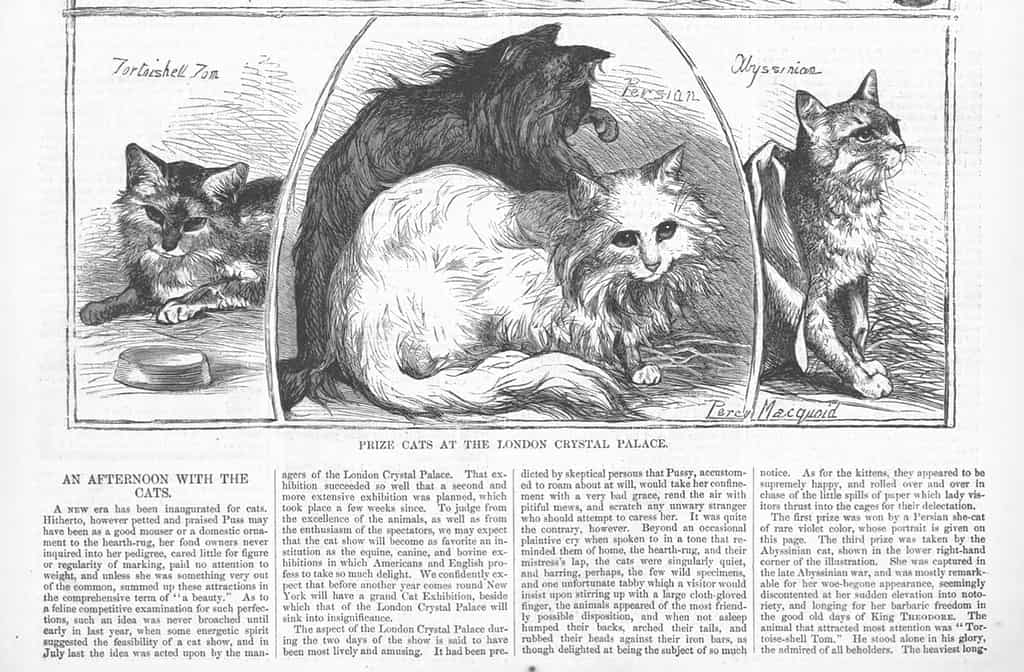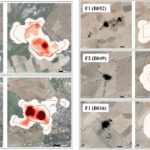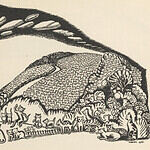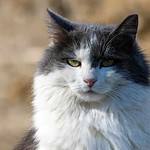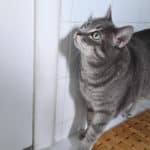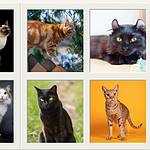Welcome back to the second in a series of cat-tastic articles that use cute and furry cats to teach new vocabulary (along with some other animals). Learn new and interesting words illustrated through the world of cats.
Make sure to check out Learn Vocabulary with Cats – Part 1.
Cats Wish for Outdoor Walks to Abate
These cats wish their owners would abate with the practice of trying to take them outside for a walk!
The word ‘abate’ is a verb, meaning to lessen in amount or intensity. The word comes from Latin origins and moved into the French abatre before making its introduction into the English language in the Middle English period. Synonyms of abate include to subside, to die down or to die away, to lessen, ease off, decrease, diminish, and remit. The opposite, or antonym of abate is to intensify.
Cats are certainly not known for their approval of authority- cats have the reputation of being self-oriented and entirely looking out for their own comfort. Some cats are well used to being outside, whether they live on farms or in fenced in areas in the suburbs. Other cats that live in apartments or difficult areas may not have the freedom or ability to roam outside, and therefore are relegated back to the indoors.
Some of these cats may have wished to remain inside, but their owners had different ideas!
These felines were leashed and taken out to explore the big, green world outside their front doors, all under the helpful watch of their dear owners.
Some of them were curious, as cats often are, but others wish their owners would abate their outside walking dreams and take them back into their cozy cat beds in their warm homes. A sunbeam blazing in through a window is as close to the outdoors as some of these kitties wish to be!
This Cat and Dog Show off Their Alacrity
Alacrity is a noun. It found its way into the English language near the beginning of the 16th century. It comes from the Latin world Alacri, which means “Lively.” Alacrity has two related meanings. Its first meaning is an eagerness and passion. The second meaning is fast and agile. During the 1500s, the word became synonymous with “fast,” “agile,” and “energetic.”
Today, the word usually isn’t meant literally. While several hundred years ago, “He has alacrity” meant that someone was nimble and quick, able to move and act with great speed and energy. The word is often associated with animals. Rabbits, for example, were well-known for their alacrity. Rabbits cannot only move fast, but they can go from zero to high speed in a fraction of a second, and it never seems to tire them out.
In modern times, “Alacrity” is rarely used to mean physical speed. Rather, you would say “She has alacrity” to refer to someone who was ambitious, someone who works hard and doesn’t seem to get tired.
Today, the word alacrity is less literal. The word essentially means the same thing that it did five hundred years ago. Except today, people use it to mean a way someone behaves. Five hundred years ago, it was just another way of saying “Fast and energetic.”
Alacrity is often used to mean enthusiasm. If someone possesses alacrity, they don’t do things halfway—when they do something they, throw all of their weight into it.
Starfish Attempts to Blag This Fish’s Cave
Blag is a verb that means to “obtain or achieve by persuasive talk or plausible deception.” Blag in this form and usage originates from the 1930s although definitions of the word have been around since the 1880s. The word can be used as a noun to describe the deception or as a verb.
This starfish is certainly attempt to blag its way into a new home. A visitor to the Scripps Aquarium in San Diego captured this scene between a fish and a starfish.
The fish is busy scooping sand with its mouth to create a new home. Back and forth the fish goes, excavating piles of sand from underneath a rock. Ever so slowly, a starfish stealthily creeps forward towards the prized caved.
At first the fish seems to be oblivious to the encroaching starfish. After one trip back from digging sand, the fish dumps its load right next to the starfish before returning to its work after a brief rest.
After a few more trips and the continue march of the starfish towards the newly dug cave, the fish finally decides enough is enough. The fish picks the starfish up and ferries it off to a location a few feet away from the cave before calmly returning to its task.
Problem solved.
Bliss is All the Catnip You Can Roll In
Bliss is a state of perfect happiness or great joy. The noun has made its way through variants of the English language via the Proto-Germanic word blīþisjō for “joy, goodness, kindness”.
Bliss is also what this very lucky cat stumbled into when it found the stash of catnip toys at a Dutch pet store.
Apparently the cat wandered into the store by accident and soon found its way to the motherland of all that is intoxicating for cats. Eventually the owner came by to collect the wayward but extremely happy pet.
This Cephalopod is the Marine Version of Dumbo
With flappy fins that hang down past the eyes, this octopus looks like an oceanic version of Dumbo, the elephant from the Disney movie who is able to fly with his wing-like very large ears.
Octopuses are part of a class of animals called Cephalopoda and are collectively referred to as cephalopods. The word cephalopod means “head foot” and originates from the Greek word kephalé for “head” and pous for “foot”.
Cephalopods are predatory mollusks that also include nautiluses, squid, and cuttlefish. Members of this class have the common characteristics of being able to change colors and textures, squirt ink as a defensive mechanism, have three hearts to pump blood, and are jet-powered.
Cephalopods are found in all of the world’s oceans from the poles to the tropics. This class of animals exists at all depths of the ocean from intertidal zones to the deep ocean.
Dumbo octopuses are members of the Grimpoteuthis genus and live in the deep ocean; most species of this type of octopus are found living at depths of 3,000 to 4,000 metres (9,800 to 13,100 ft).
These octopuses tend to hover above the seafloor as they search for their prey, mainly shrimp and crab. Dumbo octopuses are rather small, tending to be on average about eight inches in length.
This video captured by Nautilus Live shows the Dumbo Octopus in action. As Timothy Q. Mouse would say, “Hot diggety! You’re flyin’! You’re flyin’!”
These Deracinated Animals Became the Most Unlikely Friends
The word ‘deracinate’ is a verb that means to uproot someone or something from their natural geographic, social, or cultural environment. This may be the case for families with children who move about frequently, who aren’t able to grow communities around them before they leave for a new location.
Some individuals purposefully uproot themselves from their natural environments, choosing to live or travel to places they aren’t familiar with.
The etymology of the word deracinate comes from the Franch deraciner, which expresses the idea of removal. This word was introduced in the English language in the late 16th century and has grown and fallen in popularity since then.
An example of the word deracinate comes in the form of a lion, tiger, and a bear that were taken from their homes and raised in captivity together. These animals were Leo the lion, Baloo the bear, and Shere Khan the tiger.
These three animals were deracinated as young animals and taken into captivity, where they bonded together. They were rescued from their harmful environment and taken to Noah’s Ark Animal Shelter in Georgia where they now live.
Although these three animals would never have lived near each other in the world, nor would Georgia have been their natural habitat, they have managed to survive despite a tumultuous existence and remain the best of friends over 15 years later.
This Cat’s Emollient Touch Puts Crying Baby to Sleep
Emollient is both an adjective and a noun, both meaning to be soothing or softening. The word came into use in the English language in 1643 and evolved from the Latin emollire meaning to soften.
Now, parents with infants know all too well how hard it can be sometimes to get their babies to fall asleep. Parents have tried all sorts of emollients from lullabies to rocking in order to lull their babies to sleep.
Enter the baby whisperer.
In this video, a very red faced and upset infant is crying and fussing. Next to him a cat is calmly sitting. Much like a mother might press the palm of her hand gently on an infants chest to sooth, the emollient cat patiently pats the infant’s head over and over.
As the baby settles into a fitful sleep, the cat continues to rest its paw on the baby’s head as if to make sure the baby enters a more restful slumber. Only once the cat is assured that the baby is finally into a deep sleep, does it remove the paw from the baby’s forehead.
Facile Activity Proves Difficult for Cat
The word facile means to ignore the true complexities of an issue, but can also mean to take a superficial view of a person or activity. Facile can additionally mean to find success easily.
To take a facile approach to something could mean to have a superficial or simplistic way of going about things.`
The word facile is an adjective and appeared in the late 15th century. The word has its origins in the Latin facere (to do or make) or facilis, meaning easy.
The word later appeared in French translated to ‘easily accomplished.’ The word has fallen into relative disuse in recent years but held strong in the mid-19th and 20th centuries.
The cat in the video approached his leap to another part of the house in a facile manner. The cat seems to think that he can make the leap quite easily- maybe he’s done it before and succeeded that time.
However, the cat finds this facile activity not so easy this time around. The cat ignored the complexities of the distance he needed to jump in order to make it to his destination- perhaps the cat also failed to take into consideration potential factors that would make his jump improbable.
Maybe the cat misjudged the distance or relied on one of his nine lives to get him from Point A to Point B. Maybe the ledge was a bit wet and the cat couldn’t adjust for extra weather conditions.
Whatever the issues were, the cat took a facile approach to a facile activity and found it more difficult than he previously imagined. Maybe next time the cat will think a bit more in-depth about where he’s going and how he can get there the easiest and safest way possible!
Fodgel Feline Still Manages to Squeeze Into a Vase
Fodgel is an adjective used to describe someone who is “fat; stout; plump”. The word was first recorded in 1724 and its etymology is unknown although it is a variant of fadge meaning a short, fat person.
While current dictionaries define the word purely from a weight point of view, A Dictionary of Lowland Scotch (1888) defines fodgel as someone who is a combination of being fat and good-natured.
In this video, a very rotund tabby cat is determined to make its way into a ceramic vase. The fodgel feline seemingly defies reality as it enters the small opening of the vase.
For a few seconds, the cat’s back legs and tail appear stuck outside the vase. A few subtle adjustments with the body, and the entire cat’s body disappears into the vase must the to amusement of the videographer.
Funny Fish Flabbergasted by Science
To be flabbergasted is to be in a state of true astonishment; someone is flabbergasted when they have been taken by surprise with a new situation or bit of information. Synonyms of the word flabbergasted include to shock, astonish, to take aback, to amaze, startle, or surprise.
The origins of the adjective flabbergasted are relatively unknown. The word came into the English vocabulary as early as the 1800s and has risen in popularity in the centuries since. The word, according to some, comes from the words flabber and aghast.
Others contend that it is a dialectical word coming from the Suffolk region of England, or from the word flabrigast from the area of Perthshire. While the origins of this entertaining word remain fuzzy to wordsmiths, no one was more flabbergasted than this little fish to behold the miracles of science.
This flabbergasted fish has its own peculiar way of showing its shock and surprise at the sight of a diver.
Garrulous Porcupine and His Pumpkins
Garrulous is an adjective meaning excessively talkative, particularly in a rambling or trivial way. Teady Bear the porcupine demonstrates his garrulous nature with all sorts of cute and almost humanlike joyous mutterings as he chomps away on mini pumpkins.
Teddy Bear is a North American porcupine who was found as an abandoned newborn in Texas and raised by staff at Zooniversity. Teddy Bear has since become a viral sensation on YouTube for his garrulous nature, especially when eating treats like the pumpkin in this video.
At one point, his handler asks him to say the word pumpkin and the noise that emanates from the porcupine sounds almost like the word.
This Kitten and Owl are Improbable Friends
When one thinks of cats and birds, friendship usually doesn’t top the list of attributes for the relationship between the two types of animals. While the 1871 nonsense poem, “The Owl and the Pussycat,” by Edward Lear is still a childhood favorite, the idea of a cat and an owl getting along is usually an improbable one.
Improbable is an adjective that means “not likely to be true or to happen”. The word evolved in the 16th century from Middle French via Latin from the word improbabilis, meaning in- ‘not’ and probabilis meaningprobable. The base word probabilis evolved from the Latin word probare meaning ‘to test, demonstrate’.
This owl and cat have formed an improbable friendship. From Catalonia Gebra (meaning frost), a barn owl (Tyto Alba) and Fum (meaning smoke), a black domestic shorthair cat show how they play and groom each other in this fun video.
These two friends love to play on the ground and in the trees, batting and hopping around each other. While Gebra was trained in falconry, she avoid contacts with humans but enjoys visiting with Fum on occasion.
The Obdormition of Cats is Adorable
Have you ever experienced a time when you just couldn’t keep your eyes open? The feeling of drowsiness can be powerful and sometimes, you just have to fall asleep. The noun obdormition refers to the state of falling asleep or being asleep.
According to the Oxford English Dictionary, the word entered the English lexicon in 1634 [1] and is taken from the Latin obdormīre which means to “fall asleep.”
The cute cats in this video are trying their very hardest not to enter obdormition. Eyes drifting close, these cats and kittens fail again and again as they try and fail to stay awake.
All eventually succumb to sleep.
Querulous Pika Pipe Through the Hills
The pika is one of nature’s cutest creatures, a fluffy relative of rodents and hares that lives in the mountainous regions of North America, Asia, and parts of Eastern Europe. They make their burrows in the rocky slopes of mountain peaks and forage for plants and other tasty treats to store for the cold winter months. Pika often resemble smaller prairie dogs or marmots from far away, but are a distinct species unto themselves.
Pika are known for making a high pitched squeak to communicate between themselves. They are diurnal, which means they are primarily active during the daytime and don’t hibernate during the winter. Pika spent most of their days hopping about the slopes of their rocky homes collecting food for the winter and are relatively solitary creatures.
Eurasian pika are more likely than their North American counterparts to live in small family groups; Northern American pika are known for being asocial outside of the regular breeding season.
These small animals are sometimes called whistling hares for the querulous, high-pitched noises they make. Querulous means complaining or vocalizing in a petulant or whining manner. Querulous can also connote being grumpy, surly, impatient, grumpy, or cantankerous.
The English word comes from the Latin queri, or complain, which changed into the Latin querulus and then into querulosus in Late Latin. The word querulous was adopted by the English language in the late 15th century and remains a beautifully descriptive adjective.
This querulous pika may be wondering where his friends have wondered off to and is trying to locate them in the rolling hills of his home. The vocalizations of the pika are loud compared to such a small creature! While they burrow away in their mountain homes for the winter, the pika will be back in the spring to resume their querulous calls across the mountains.
This Sleeping Cat Nearly Falls into the Ruelle
A ruelle is defined as the space between a bed and the wall and also by association, the side of a bed that is next to the wall. The archaic noun evolved into this definition in the early 1400s and is borrowed from Middle French from the diminutive of rue (meaning street). In Middle French, ruelle means alley.
This cat is peacefully sleeping at first, the only movements coming from its mouth twitching in concert with whatever dreams the cat seems to be having.
At one point, the cat slowly opens one eye to see who is filming it. After a few moments, the cat decides a stretch is in order. Unfortunately, the stretching causes the cat to lose its balance and it starts to slide off the bed into the ruelle.
A quick grabbing of the bed cover with its claws saves the cat from completely falling off the bed and the only damage is to the cat’s sense of dignity as it rights itself.
Cats Underwhelmed by Dogs
Underwhelm is a verb meaning to “to fail to impress or stimulate.” A relatively recent entry into the lexicon, underwhelm originated around the mid 20th century.
Underwhelm, according to the Oxford English Dictionary, has its earliest written example in Giant Corporations (1956), by T. K. Quinn who wrote about rising prices, ” “I was underwhelmed, and investigated.”
In contrast, overwhelm, meaning in modern terms to “defeat completely,” has been in use since the 1300s.
Most cat owners understand that felines are pretty finicky creatures and impressing them can be a challenge. That challenge doesn’t stop these dogs from trying to play with these less than impressed cats.
Despite their best efforts at prancing, howling, and licking their feline friends, these dogs underwhelm these bored cats. This montage shows dog after dog underwhelming cat after cat.

